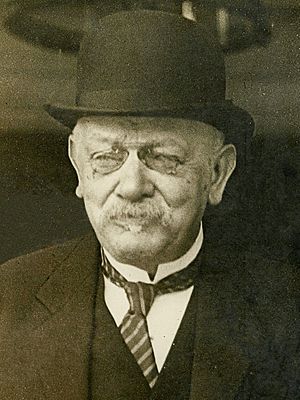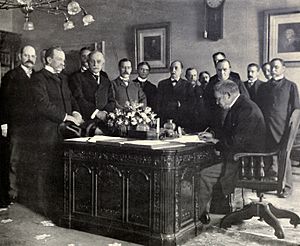Jules Cambon facts for kids
Quick facts for kids
Jules Cambon
|
|
|---|---|
 |
|
| Born | 5 April 1845 Paris, France
|
| Died | 19 September 1935 (aged 90) Vevey, Switzerland
|
| Occupation | Diplomat |
| Relatives | Paul Cambon (brother) |
Jules-Martin Cambon (born April 5, 1845 – died September 19, 1935) was an important French diplomat. A diplomat is someone who represents their country in other nations. They work to keep peace and good relationships between countries. Jules was the brother of another famous French diplomat, Paul Cambon.
Jules Cambon served as France's ambassador to Germany from 1907 to 1914. He worked hard to create a friendly "détente," which means a relaxed relationship, between France and Germany. However, some French leaders, like Raymond Poincaré, believed Germany was trying to weaken the Triple Entente. This was a strong alliance between France, Russia, and Britain. Many people in France at the time felt that a big war was unavoidable.
Early Life and Career

Jules Cambon started his career as a lawyer in 1866. He later served in the Franco-Prussian War, a major conflict between France and Prussia (part of Germany) from 1870 to 1871. After the war, he joined the French government's civil service in 1871.
He became a "prefect," which is a high-ranking official, in different regions of France. He was prefect of Nord in 1882 and of Rhône from 1887 to 1891. In 1891, he became the governor-general of Algeria, a French territory in North Africa. He had worked in Algeria in a smaller role earlier, in 1874.
Diplomatic Roles and Peace Efforts
In 1897, Cambon was chosen to be the French ambassador to Washington, D.C., in the United States. While serving there, he played a key role in peace talks after the Spanish–American War of 1898. He helped negotiate the first steps towards peace for the Spanish government.
Cambon was very active in the peace negotiations between Spain and the United States. He helped create the final agreement, known as the Treaty of Paris (1898). His work in these talks helped Spain and France build a strong political partnership.
In 1902, Cambon became the ambassador to Spain. Then, in 1907, he moved to Germany, where he served until World War I began in 1914. During the war, he led the political section of the French Foreign Ministry.
World War I and Beyond
Jules Cambon strongly believed in the Entente Cordiale, a friendly understanding between Britain and France. He worked to make the diplomatic ties with France's main ally even stronger. Secret talks led to plans for the future of Palestine after the Allied victory over the Ottoman Empire.
As World War I was ending, Cambon advised the French Prime Minister, Alexandre Ribot. There was a secret agreement called the Sykes–Picot Agreement, which was known only to Paris and London for many months. Cambon helped with the Triple Entente's plan for an alliance of Arab, Zionist, and Armenian groups. This happened after the Ottoman Empire's ruler was overthrown and a military group called the Young Turks took power.
His department shared important military and other information with the British Foreign Office. This was all part of the effort to defeat the Central Powers (like Germany and Austria-Hungary).
In 1928, Jules Cambon published a famous book about diplomacy called Le Diplomate. It was translated into many languages. In the book, he wrote that a true diplomat seems to be calm and unaffected by emotions. He said diplomats must show a professional reserve that might seem hard to understand to others.
His brother, Paul Cambon, was also a well-known French diplomat.
See also
 In Spanish: Jules Cambon para niños
In Spanish: Jules Cambon para niños
- French entry into World War I
 | William L. Dawson |
 | W. E. B. Du Bois |
 | Harry Belafonte |

